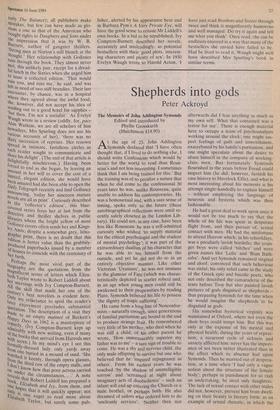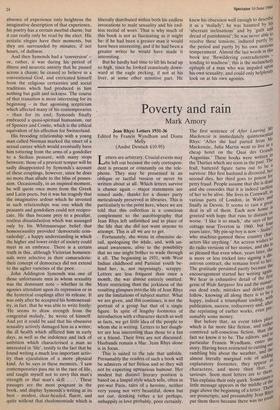Shepherds into gods
Peter Ackroyd
The Memoirs of John Addington Symonds Edited and introduced by Phyllis Grosskurth (Hutchinson £14.95) thought that, if I lived to do nothing else, I should write Confessions which would be
At the age of 23, John Addington Symonds declared that '1 have often
better for the world to read than Rous- seau's and not less interesting. I sometimes think that I am being trained for this.' But the training was of so peculiar a nature that when he did come to the confessional 30 years later he was, unlike Rousseau, quite unable to address his contemporaries. He was a homosexual and, with a sure sense of timing, spoke only to the future (these autobiographical reflections were until re- cently safely closeted in the London Lib- rary). He could not, in any case, have been less like Rousseau: he was a self-admitted curiosity who wished `to supply material for the ethical psychologist and the student of mental psychology'; it was part of the extraordinary dualism of his character that he was able to see himself from the outside, and yet he did not do so in an entirely objective manner. Like other Victorian I.Jranians', he was not immune to the glamour of Fate (which was charac- teristically depicted in scarlet robes) and, in an age when young men could still be awakened to their propensities by reading Plato, Symonds believed his life to possess `the dignity of tragic suffering'. He came from a long line of Nonconfor- mists — naturally enough, since generations of familial puritanism are bound in the end to produce strange fruit. He remembered very little of his mother, who died when he was still a child; of his other parent he wrote, 'How immeasurably superior my father was to me' — a sure sign of trouble to come. He was a shy and nervous child, the
only male offspring to survive but one who believed that he 'inspired repugnance in others'. From his earliest years he was touched 'by the shadow of unintelligible sorrow' and 'screamed at night about imaginary acts of disobedience' — such an infant will end up entering the Church or a male brothel, or perhaps both. He also dreamed of sailors who ordered him to do
'Neither then nor `uncleanly services': afterwards did I fear anything as much as my own self. What that contained was a terror for me'. There is enough material here to occupy a team of psychoanalysts working around the clock; one might sus- pect feelings of guilt and unworthiness, exacerbated by his family's puritanism, and one might speculate about the desire to abase himself in the company of working- class men. But fortunately Symonds flourished in the years before Freud could inspect him (he did, however, furnish his case history to Havelock Ellis), and what is most interesting about his memoirs is his attempt single-handedly to explain himself — without employing the language of neurosis and hysteria which was then fashionable.
He had a great deal to work upon since it would not be too much to say that the whole of his life was spent in desperate flight from, and then pursuit of, sexual contact with men. He had the misfortune to attend Harrow which, in his schooldays, was a peculiarly lavish bordello; the youn- ger boys were called 'bitches' and were given names like 'Leila' and 'Bum Bath- esba'. And yet Symonds remained virginal and aloof, convinced that such behaviour was sinful; his only relief came in the study of the Greek epic and bucolic poets, who not only described the camaraderie of the tents before Troy but also painted lavish • pictures of gods disguised as shepherds thus preparing Symonds for the time when he would imagine the shepherds to be disguised as gods.
His somewhat hysterical virginity was maintained at Oxford, where not even the choir boys could tempt him. But this was only at the expense of his mental and physical health; during the years of repres- sion, a recurrent cycle of sickness and anxiety afflicted him: never has the import- ance of sex been better illustrated than in the effect which its absence had upon Symonds. Then he married out of despera- tion, at a time when 'I had only a vague notion about the structure of the female body'; perhaps in punishment for so rash an undertaking, he sired only daughters.
The lack of sexual contact with other males did not, however, prevent him from dwell- ing on their beauty in literary form: as an example of sexual rhetoric, in which the absence of experience only heightens the imaginative description of that experience, his poetry has a certain morbid charm; but it can really only be read by the elect. His ecstatic elegies have their moments, but they are surrounded by minutes, if not hours, of dullness.
And then Symonds had a 'conversion' or, rather, it was during his period of illness and neurotic anxiety that he passed across a chasm; he ceased to believe in a conventional God, and extricated himself from the religious certainties and social traditions which had produced in him nothing but guilt and sickness. The course of that transition is more interesting for its beginning - in that agonising scepticism which affected many of his contemporaries - than for its end; Symonds finally embraced a quasi-spiritual humanism, out of Spencer and Comte, which is the ethical equivalent of his affection for Switzerland.
His brooding relationship with a young man called Norman marked the onset of a sexual career which would eventually have him tottering from the arms of a gondolier to a Sicilian peasant, with many stops between; those of a prurient temper will be sadly disappointed by Symonds's account of these couplings, however, since he does no more than allude to the bliss of posses- sion. Occasionally, in an inspired moment, he will quote once more from the Greek and Latin poets, but it was his tragedy that the imaginative ardour which he invested in such relationships was one which the peasants and gondoliers could not recipro- cate. He thus became prey to a peculiar, restless dissatisfaction which was assuaged only by his Whitmanesque belief that homosexuality provided `democratic com- radeship', a happy understanding in which the higher and lower order of society could meet in an embrace. There is a certain truth in this, although Victorian homosex- uals were selective in their camaraderie: their concept of democracy did not extend to the uglier varieties of the poor.
John Addington Symonds was one of those unfortunate men in whom sexuality was the dominant note - whether in the agonies attendant upon its repression or in the hysterical couplings after its release. It was only after he accepted his homosexual- ity, in fact, that he was able to write freely: `He seems to draw strength from the congenital malady,' he wrote of himself. And yet it could be said that his obsessive sexuality actively damaged him as a writer; the ill health which afflicted him in early days, as well as the indolence and lack of ambition which characterised a man so interested in 'life', testify to the fact that he found writing a much less important activ- ity than ejaculation of a more physical kind. As he says in these memoirs, 'I saw contemporaries pass me in the race of life, and taught myself not to envy this man's strength or that man's skill . .'. These passages are the most poignant in the book, and display Symonds's writing at its best - modest, clear-headed, fluent, and quite without that rhodomontade which is liberally distributed within both his endless invocations to male sexuality and his end- less recital of woes. That is why much of this book is not as fascinating as it might be: if he had been a greater man it would have been interesting, and if he had been a greater writer he would have made it interesting.
But he hardly had time to lift his head up so high, since he looked ceaselessly down- ward at the eagle pecking, if not at his liver, at some other sensitive part. He
knew his obsession well enough to describe it as a `malady'; he was haunted by his `aberrant inclinations' and by 'guilt and dread of punishment'; he was never able (0 resolve these tensions, induced partly by the period and partly by his own anxious temperament. Almost the last words in this book are 'Bewildering contradictions - tending to madness'; this is the melancholy epitaph of a man who was impaled upon his own sexuality, and could only helplessly look on at his own agonies.













































 Previous page
Previous page